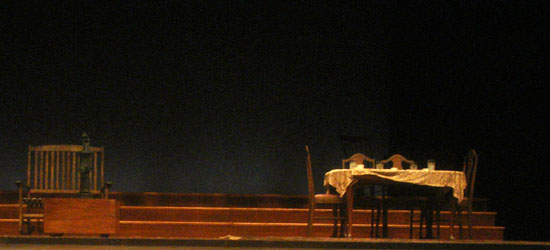Disembodied children's voices are creepy in their own right. When the voices talk back it's that step up into the attic where ghosts will sit during the day playing their pinochle and shell games. What a way to introduce someone.
Frustration is the underlying theme in The Miracle Worker and it digs its heels to work that angle in all manner of vibrations. The child wanting to communicate. The son wanting his father's acknowledgement. The mother without hope. The teacher trying against her walled student. Everything works together in the end.
Helen Keller (Hannah Appell) is the seed of the play, but, as eponymous as a clear day, it's really all about Annie Sullivan (Caitlin McRae). Strong-willed and stubbornly persistent as Sullivan, McRae draws out a visceral exhaustion of fighting a damn tough battle, of unseating the many years of the Kellers enabling Helen to flounder aimlessly spoilt in her condition. McRae handles Sullivan's conflicts of confidence with an effortless and commanding stride.
Appell, with not a word, captures the deafblind anguish and struggle of having a mind trapped without a means of expression. Of sitting behind doors and wanting to get out there and talk. She does in a feeble, infantile way as a six-year-old would, but each grunt, each tantrum, is wrought with potential, screaming for a voice.
Lily Gladstone conveys Kate Keller's hopelessness in an entirely sympathetic exposure. A mother unable to do anything but to put her trust into this strange new person from Boston. She's grasping, and it's heartbreaking to watch.
Spots and sprinkles of comedic punches balance out the heaviness of the drama. James Keller is one sullen character, and Nick Pavelich fills his scenes with acerbic barbs that hide a wanting. Jim Gall as Captain Keller, is at the lead here though. Authoritative in one second, a fluster out of his depth the next and that contrast sings a laugh. The lighter moments, however, never sacrifice the overall tone and only enhance it.
It's a fitting way to remind you to breathe, relax a little and realise that there is always a way for sunshine to crack through the darkest of corners.

Cast into the stage background, a screen projector works as an underscore. As a shorthand for dressing the scene, say for the rest of the house, it's fine. When Sullivan has her flashbacks/nightmares and that loud dripping sound pings with the shaking still of the hospital sign, it is eerie and unnerving. Carry the beat then, when it breathes in a moody air as Sullivan and Keller's hands spell out words, giving everything a name. It's deliberate, trying and echoes the scene in front, but never overpowers. The projection shifts into a beautiful resonating flourish in the denouement and is like a rainbow injected directly into your eyeballs.
At that point a massive heft of weight wrenches out of the taught muscles and explodes off the shoulders when that final scene hits. Appell and McRae absolutely nail the performance and everything comes gushing out as the wall finally breaks. A corked smile behind a caught sigh the only thing you can let out. That or to find your eyes watering, twitching a little.
There is much anguish and frustration to witness and fall into, and it's the strong performances of the cast that makes William Gibson's The Miracle Worker a delightful, yet demanding, way to feel both wrecked and hopeful.
Performed by the Montana Repertory Theatre in a quick two hours with an intermission of 15 minutes. Staged at The Center for Rural Development in Somerset, Kentucky on 25 February 2014.
Reviewed on Wednesday, 12 March 2014
